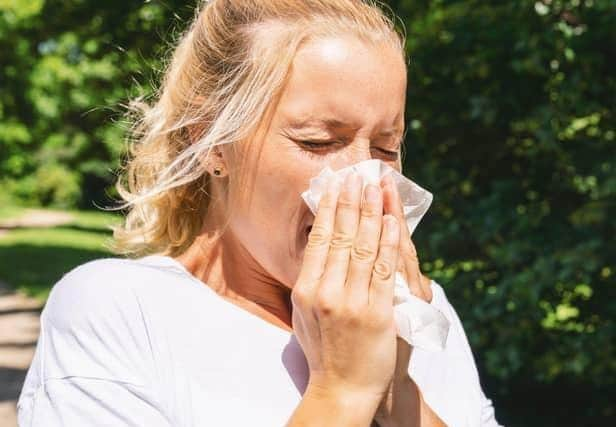'Please don't go to hospital for help with hay fever' plead NHS chiefs as pollen levels and A&E visits reach record highs in Milton Keynes
and live on Freeview channel 276
People suffering from hay fever are going to Milton Keynes hospital’s A&E rather than treating themselves at home.
The recent high pollen count saw record numbers of people seeking help, with visits to the NHS website about the subject tripling over the past few weeks.
Advertisement
Hide AdAdvertisement
Hide AdIn MK, the A&E department broke all records on Monday by seeing more than 470 patients in 24 hours compared to the usual average 300.


Milton Keynes Hospital CEO Joe Harrison tweeted: “Yesterday saw very high/ record numbers of patients attending emergency departments - locally many with respiratory symptoms.”
He described the circumstances at “very challenging.”
Around 1,000 people headed for accident and emergency units in Bedfordshire, Luton and Milton Keynes on Monday alone, many of them due to the hot, humid weather and high pollen counts.
Now, with the three day junior doctors’ strike beginning today (Wednesday), NHS bosses are urging people to ease the pressure on A&E and treat hay fever symptoms at home when possible.
Advertisement
Hide AdAdvertisement
Hide AdDr Sanhita Chakrabarti, deputy medical director at Bedfordshire, Luton and Milton Keynes Integrated Care Board, said: “The recent fine weather has sent the pollen count spiralling upwards, and many people have been experiencing severe hay fever. But most hay fever symptoms can be effectively managed at home or with medication which is widely and cheaply available in community pharmacies or supermarkets.
“With junior doctors due to take industrial action from Wednesday to Saturday this week, it’s vital that everyone gets prepared for the next few days. If you or someone you love suffers from hay fever or asthma, plan ahead for this hot spell of weather.
“Make sure you have enough antihistamines and take them as directed. If your chest symptoms are serious enough for you to require one, make sure you have a well-stocked inhaler too. Ask for a repeat prescription if you can.”
Dr Chakrabarti added: “Extreme temperatures – both hot and cold – are known to increase the risk of heart attacks and strokes. We can all do our bit to leave accident and emergency services for those who really need them: remember, A&E is for serious injuries and life-threatening emergencies only. If you are unwell but it’s not an emergency, use 111 Online to check how to get the right care for you.”
Advertisement
Hide AdAdvertisement
Hide AdAnalysis by NHS England, which runs the NHS website, found that Sunday was the busiest day of the year so far for visits to the hay fever page, with almost 28,000 visits in 24 hours – an average of one visit every three seconds.
NHS information pages on hay fever treatments have also proved popular during the past few weeks, with over 45,000 people viewing information about the most common antihistamines in the last week.
Some experts believe that climate change is to blame for the high pollen counts that are causing more and more hay fever.
One found UK oak and grass pollen seasons are starting earlier in the UK and the birch season is getting more severe.